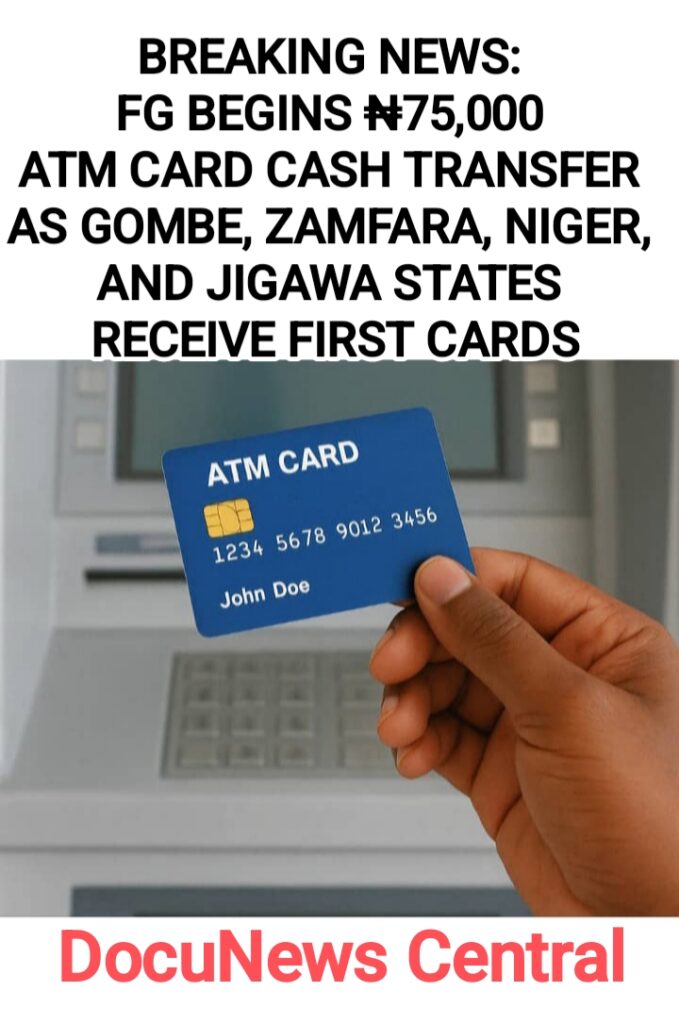
BREAKING NEWS: FG BEGINS ₦75,000 ATM CARD CASH TRANSFER – GOMBE, ZAMFARA, NIGER, AND JIGAWA LEAD THE WAY
The Federal Government has kicked off the nationwide distribution of ATM cards for the ₦75,000 cash transfer program, with Gombe, Zamfara, Niger, and Jigawa States already receiving their share. Families in these states have begun collecting their ATM cards and some have even withdrawn their first payments, marking the start of what is expected to be one of the largest social support programs in Nigeria’s history.
DocuNews Central brings you the full story, with verified updates, reactions from beneficiaries, and what this initiative means for the ordinary Nigerian.
What This ₦75,000 Cash Transfer Means
This program is designed to provide direct relief to poor and vulnerable households across the country. Each qualified family will receive up to ₦75,000, depending on their level of need. Unlike previous programs that faced delays due to manual disbursement, this one will be accessed through ATM cards, allowing beneficiaries to withdraw money directly from banks and POS agents.
The government said the move is part of its social safety net strategy to reduce poverty and cushion the impact of rising living costs.
States Already Benefiting
The rollout began in Gombe State on Friday, August 29, 2025, with a well-attended launch at Jekadafari Darazawa Quarters. From there, distribution quickly spread to other states:
Zamfara State: Over 279,000 ATM cards have already been distributed, with a target of more than 448,000 households.
Niger State: More than 50,000 cards handed out, while another 19,000 are prepared for immediate release. The total target for the state is 180,000 households.
Jigawa State: Around 23,000 households have been identified and verified. Each is set to receive between ₦25,000 and ₦75,000 depending on their vulnerability level.
These states are the first wave, and officials say more states will join in the coming days.
How Beneficiaries Are Selected
The selection is not random. The Federal Government explained that households are chosen based on a national database that tracks poverty levels, income, family size, and vulnerability. The aim is to reach those who truly need financial help the most.
Beneficiaries usually get an SMS notification directing them to specific collection centers where they complete biometric verification before receiving their ATM cards.
What Beneficiaries Are Saying
The rollout has sparked excitement and relief among Nigerians.
In Gombe, a widow named Aisha Musa told DocuNews Central:
“Things have been very hard. Food prices keep rising every day. With this money, I can buy food for my children and still pay school fees. This is a big help.”
In Zamfara, Bello Abdullahi, a farmer, expressed his gratitude:
“At first, I thought it was a rumor. But today, I collected my card. I plan to use part of the money to start a small business to support my family.”
These voices reflect the reality of many Nigerians struggling to make ends meet.
Why This Program Matters
Nigeria is battling serious economic challenges. Fuel subsidy removal, high inflation, and the weakening naira have combined to make life very difficult for millions of families.
This ₦75,000 cash transfer, while temporary, is seen as an urgent measure to reduce hunger, increase purchasing power, and restore hope among the poor.
Benefits of the ₦75,000 Cash Transfer
- Food Relief – Families can buy staple foods like rice, beans, yam, and oil.
- School Support – Parents can settle school fees, uniforms, and books.
- Health Care – Families may use the funds to pay for hospital visits and drugs.
- Business Start-Up – Some beneficiaries hope to invest in small trades such as selling foodstuff, recharge cards, or clothing.
- Boost to Local Economy – As beneficiaries spend, markets and small traders will also benefit.
Challenges Reported So Far
Like any major program, there are challenges:
Verification Delays – Some beneficiaries wait hours before completing biometric checks.
Network Failures – Poor internet service in rural areas slows down card activation.
Exclusion Complaints – Some poor families say they were left out of the program.
Fear of Corruption – Citizens worry about possible diversion of funds or illegal sales of ATM cards.
Government’s Response
The Federal Government insists the process is being handled with strict transparency. Officials from the Ministry of Humanitarian Affairs and Poverty Alleviation confirmed that banks are deeply involved to minimize fraud.
They added that all beneficiaries must undergo fingerprint verification before receiving their cards, making it harder for impostors to cheat the system.
Expert Opinions
Economic experts welcome the program but stress that it is not a permanent fix.
Dr. Samuel Ogun, an economist, explained to DocuNews Central:
“This is a short-term relief. ₦75,000 will not solve poverty, but it can save lives. For real change, the government must work on job creation, price stability, and sustainable growth.”
Steps to Check if You Are Selected
- Look Out for SMS Alerts – Messages come from official numbers linked to FG or banks.
- Visit Collection Points – Go with your voter’s card, NIN slip, or any government-issued ID.
- Biometric Capture – Fingerprints and photos are taken.
- Collect Your Card – Once verified, you get your ATM card.
- Activate and Withdraw – The money can be accessed through any ATM or POS center.
Public Reaction on Social Media
Online, the response has been mixed. While some Nigerians praise the initiative, others are cautious.
Comments trending include:
“₦75,000 may not be much, but to the poor it is a lifeline.”
“I just hope this is not another political move. Let it reach the right people.”
“This is a good step, but more needs to be done to create jobs.”
What Comes Next
The program is expected to cover all 36 states and the FCT in phases. Millions of households will eventually receive ATM cards in the coming weeks.
Officials encourage citizens to remain patient, avoid fraudsters, and wait for official notifications before heading to collection centers.
Final Word
The ₦75,000 ATM card cash transfer is one of the boldest poverty-alleviation measures by the government in recent years. While it may not solve Nigeria’s economic problems, it is already bringing relief to households in Gombe, Zamfara, Niger, and Jigawa, the first states to benefit.
DocuNews Central will continue to follow the distribution process and provide verified updates from across the country.
Stay Connected With DocuNews Central
For more breaking news and updates as they happen, don’t miss out.
👉 Follow and Subscribe to the official DocuNews Central Facebook page: DocuNews Central
Stay informed. Stay updated.








